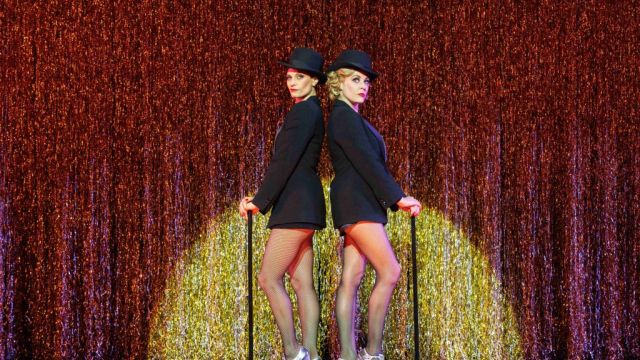Chicago
‘Give ‘em the old razzle dazzle,’ sings Billy Flynn, and it’s an apt song to describe this visually stunning production of the Bob Fosse musical. It’s a visual spectacle of dance and song that tells the story of killer women who take shameless advantage of their celebrity status in the hope that it will relaunch their flagging careers – oh, and get them acquitted by an adoring jury.
It’s centred on two women: Roxie Hart, a philandering woman who murdered a lover; and Velma Kelly, a fading vaudeville singer who has discovered she can relaunch her career on the back of a double-murder charge, supported by the cell-block’s de facto leader, Matron ‘Mama’ Morton.
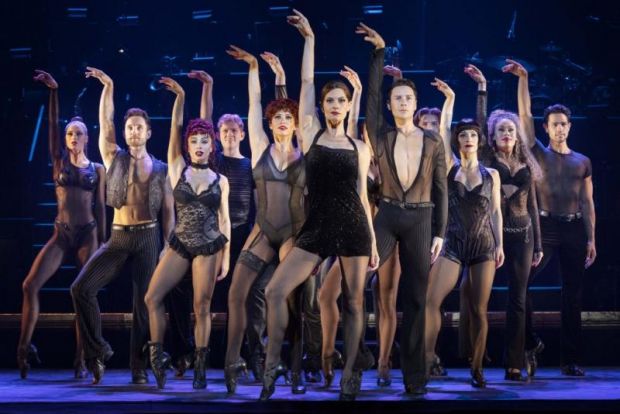
Velma isn’t happy that Roxie is stealing her limelight – and then her lawyer, Billy Flynn – and the two try to outdo each other with court appearances and fake announcements designed to return the attention of their gossip-hungry public to them. Not a lot has changed in a hundred years, with good and bad people demanding their undeserved fifteen minutes, three seasons, or four years in the spotlight.
The show’s origins are from real-life murders, the original play penned by court reporter and playwright Maurine Dallas Watkins, who covered two major cases of female murderers in 1924. Public interest grew from media reports declaring attractive women couldn’t be convicted and those reports focused more on the plight and redemption of the female defendants, fast becoming celebrities.
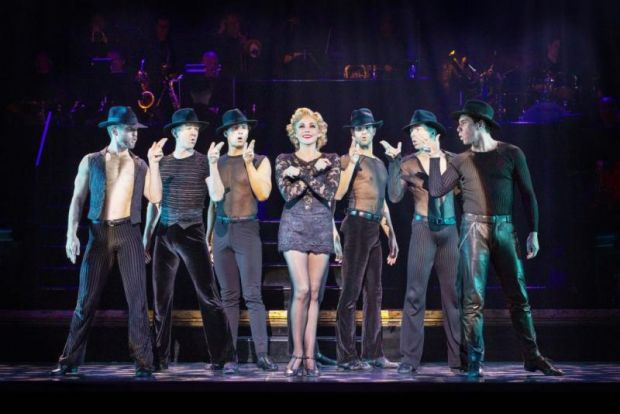
Bob Fosse eventually acquired the rights, with producers Richard Fryer and Gwen Verdon. John Kander and Fred Ebb worked on the music, basing each number on vaudeville, whilst Ebb and Fosse penned the book, with the latter also directing and, of course, choreographing the original production.
It opened on Broadway in 1975 to mixed reviews but still ran for two years. It was nominated for ten Tonys but didn’t win until its revival twenty-one years later. Returning originally as a concert, with minimal staging and costume, it quickly re-opened on Broadway to greater success, this time winning six of its eight Tony nominations.
It’s this revival staging designed to ‘stun and stagger’ at Adelaide’s Festival Centre, nearing the end of its long tour of Australia. The orchestra sit on stage, in a huge, tiered stand, within which the performers appear and disappear, as if notes from the score guided by the musical director Anthony Barnhill and his always fabulous orchestra. The rest of the set is made up of simple wooden chairs illuminated by old fashioned footlights and spots – no colour-changing LEDs are seen to spoil the century-old vaudeville feel.
Its larger-than-life characters of inmates Roxie, Velma and ‘Mama’, together with the lawyer Billy Flynn and downtrodden husband Amos, offered huge opportunities for big stars to take seasons for US and UK audiences, attracting talents from Bebe Neuwirth to Pamela Anderson, and Patrick Swayze to David Hasselhoff. The star-studded and Oscar-winning 2002 movie also adopted the minimalist styling of the 1990s stage revivals.
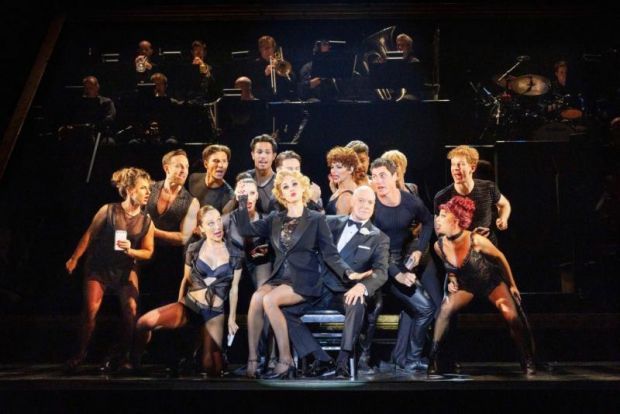
This Australian touring production is no less starry, with music theatre royalty in Anthony Warlow as Billy Flynn and Lucy Maunder as Roxie, but well supported by Zoë Ventoura as Velma, Peter Rowsthorn as Roxie’s self-deprecating husband Amos, and Asabi Goodman as Matron ‘Mama’ Morton.
Warlow is the supreme leader of the stage and those on it, dancing his way through the impressive ‘All I Care About Is Love’ surrounded by feather-bearing dancing girls, and whilst also dominant in his acting, he’s more slick than a greasy lawyer. Ventoura looks the part of Velma, has the smooth moves of the fading stage performer she portrays, and eventually finds her voice over her cellblock companions. Her relationship with Roxie is brilliant: equal parts fuming and scheming, with barely a sprinkling of sympathy quickly blown away as soon as the blonde woman opens her mouth.
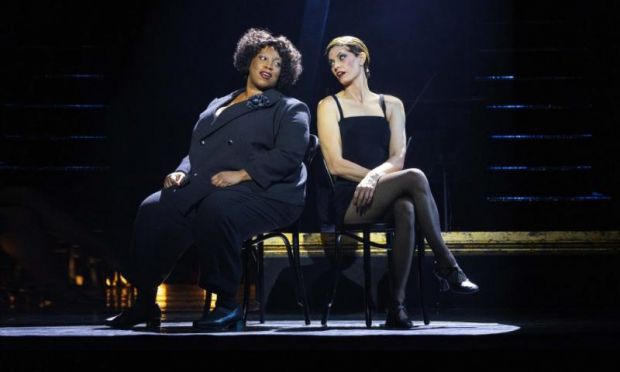
Maunder is an exaggerated Roxie: brash, loud, and utterly unafraid of everyone she should be – except when she has a moment of clarity and thinks she might be found guilty. She shines in her titular number, surrounded by her ‘boys’, but the highlight is her role in the incredibly smart and wonderfully choreographed courtroom scene, which carries so much story in its physicality with the ensemble, supported by orchestral sound effects straight out of the Saturday morning cartoons.
Rowsthorn plays Amos well – understated, enjoying his solo number ‘Mr Cellophane’, and Goodman has the power and tone for Mama, though was a lot nicer to her fellow inmates than was expected of a controlling matriarch.
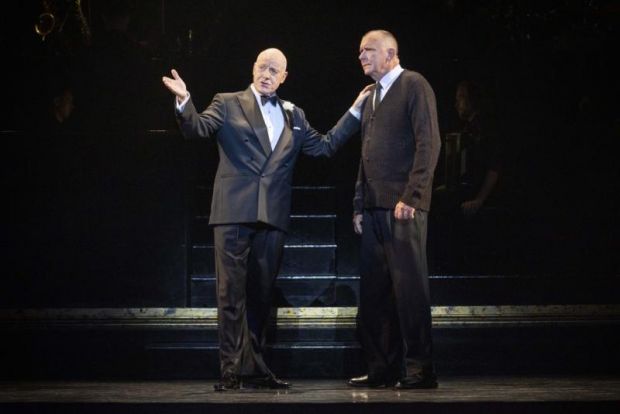
The performances from the leads are great, professional – they sing well, move well – but you can tell it’s the ninth month and fifth city of its tour. And we shouldn’t be able to see that on its opening night. There are moments they look bored or tired, and whilst they lift in the spectacular numbers, when the music tails off, so does the performance.
The ensemble by contrast is consistently superb – never flagging, not once. They dance and move well together, and despite their collective nature, bring individuality to each of their characters. Sarah Heath dominates as Go-To-Hell Kitty, and with every dance she’s in: surpassing even Warlow in their duets. Emma Russell’s Hunyak is brilliant as she tells her story through the expressions on her face, and how she stands proud when she repeatedly says her only two words in English: ‘Not Guilty’. And Devon Braithwaite brings physical comedy and seduction to his Fred Casely.
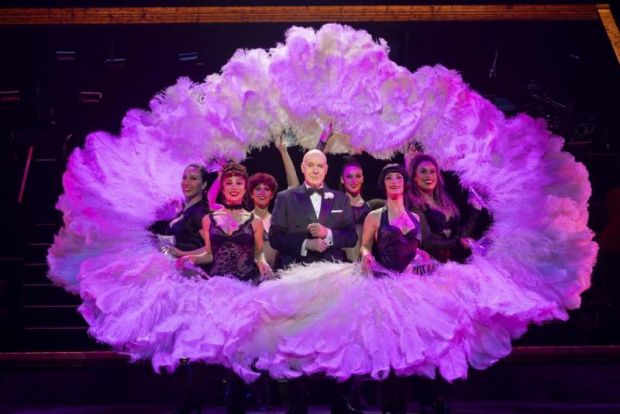
Chicago boasts some wonderful musical numbers – ‘All That Jazz’ is a triumphant opening to the show, and the ‘He had it coming’ refrain through ‘Cell Block Tango’ frames its deliciously wicked verses (‘And then he ran into my knife. He ran into my knife ten times’). Ventoura and Goodman duet wonderfully on ‘Class’ and both Ventoura and Maunder make Fosse’s original choreography shine bright in ‘Hot Honey Rag. ‘Razzle Dazzle’ is a shiny spectacle of audience seduction with over-the-top visuals, provocative dancing, and bold music – but it’s a good summary of this production. Its line ‘When you’re in trouble, go into your dance’ hits a nerve, before the company fulfills the number’s title and we’re smiling again: ‘How can they hear the truth above the roar?’.
Review by Mark Wickett
Photographer: Jeff Busby
Subscribe to our E-Newsletter, buy our latest print edition or find a Performing Arts book at Book Nook.

